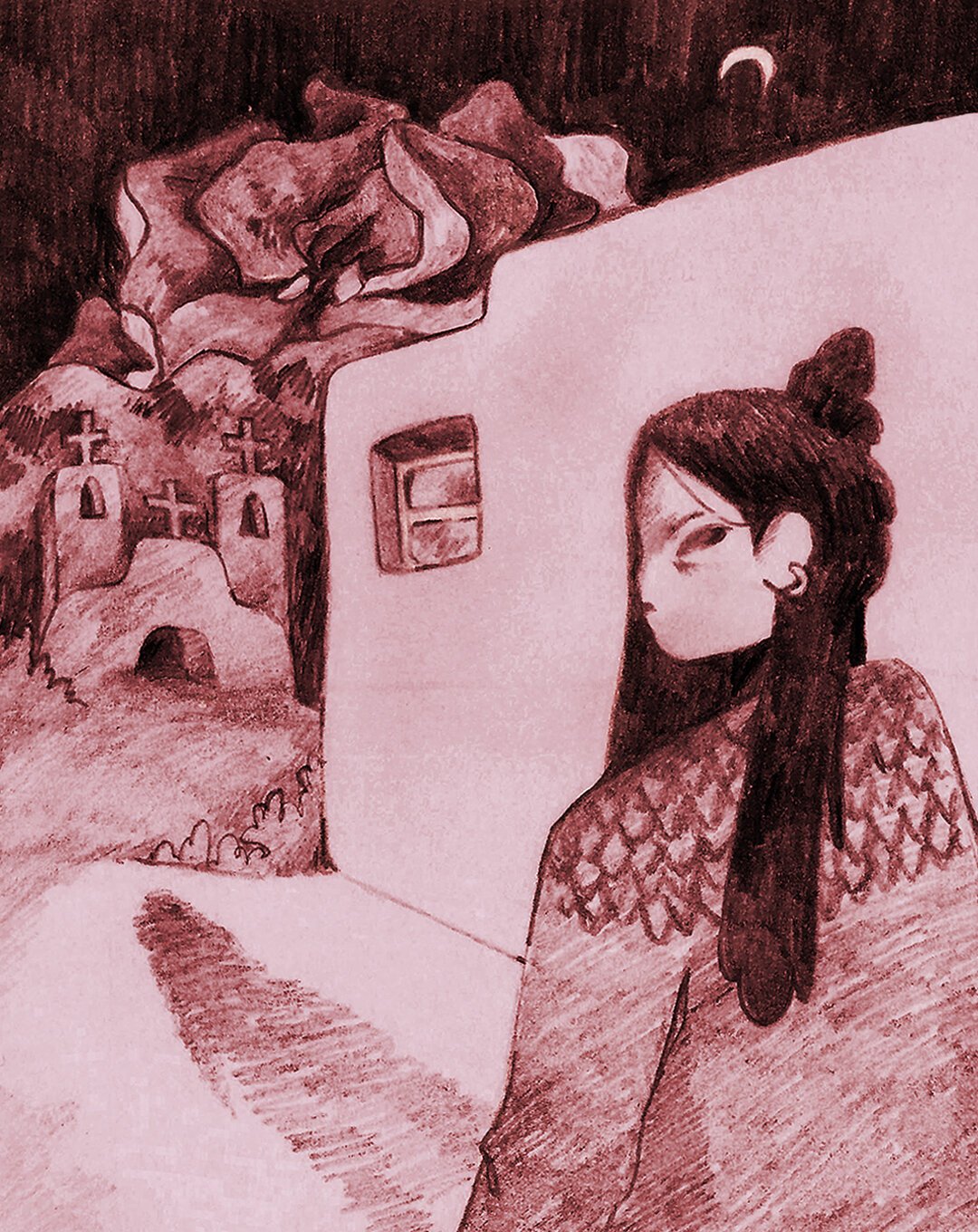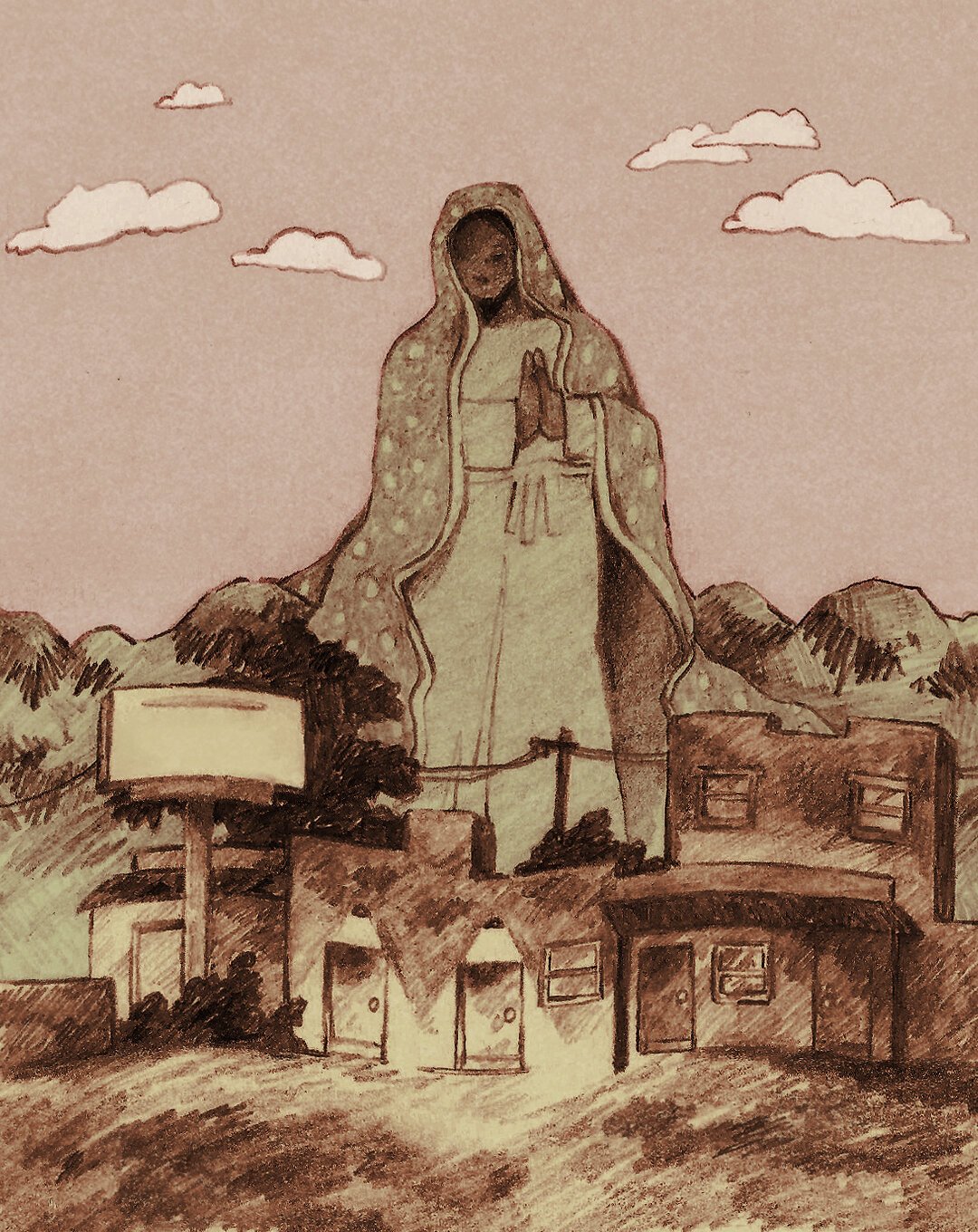Dark Ages: Land of Enchantment
Make it stand out
In the mountains, you can watch storm clouds from miles away, glowing like a threat for hours before any rain makes landfall. It’s easy to see metaphors in this desert, the big skies and vast quiet presumably ripe with inspiration for artist types. It’s also a gentrification that the Santa Fe government has come to rely on, peddling a tourist narrative that this city, just shy of 100,000, is a global arts center. Georgia O’Keeffe pioneered this idea; trading New York for New Mexico for health and revelation. Over the next half century, lesser artists would follow suit—though every bar in the town closes at 11pm, so how thriving can the arts community really be?
“There’s not much to do here besides drink and couple up,” a sexy local with bad teeth admits, “maybe that’s why we have some of the highest teen pregnancy and DWI rates in the country.” She then convinces me to buy a pasta called the ‘Sophia Loren’ and suggests I visit a downtown motel at 3AM to spot a ghost.
At a show—also in a motel; it’s mostly motels in the Southwest, the region being very committed to notions of transience... but there go those metaphors again—transplants assure me that there are, in fact, things to do in this city. Then we watch musicians from other places play.
When I check out of my particular motel, the concierge is confident I will return. “Santa Fe resident 100,001 is already on your back,” he jokes, “you’ll get trapped here like the rest of us.”
In 1990, the state formally adopted the slogan ‘Land of Enchantment’—this kind of shit interests me, having spent all my adult life in a city similarly defined by mythology. But in my town, just shy of 9 million, inspiration is not found in wide open spaces, rather in the claustrophobic dog-pile of cultures. In New York, making art and, crucially, selling it feels more like an imperative than a practice. Talent without ambition is frowned upon, while ambition without talent doesn't really seem to bother anyone. My generation seems to have confused making money with value, or worse, followers—an even less liquid cachet than artistic merit. It’s a broken record I’ve put on: disappointment with my peers' priorities, but everything feels especially gross these days.
“I had to ask myself, ‘How can I inject my identity into my brand?’” An influencer tells an aspiring digital creator, or so they’re called. I want to feel morally superior, but I’m producing the segment. Modern life, or so it’s called, is a little humiliating. While the digital creator, the influencer and his best friend who talks like a manager swap career tips, I consider how it’s odd that no one calls anyone else a “sell out” anymore. Some days capitalism victimizes me, some days it’s a convenient excuse.
* * *
At a techno club, a popular columnist for a real magazine tells me, “People speak differently around me now.” It’s disconcerting to listen to an objectively successful artist be dissatisfied. But then, an unpopular writer expresses a similar sentiment on a different night, at a different bar. The internet has made us so declarative.
this is THE LAST DAY we’ll be without lorde’s third album. solar power comes out tomorrow. the world as we know it will change forever. brace yourself. good luck on your journey. and i’ll see you on the other side, is a tweet that’s still making me laugh. The language surrounding art has become very extreme. Things are called iconic within weeks of their release, and whenever an artist does something differently, it’s a new “era.” Then everyone argues online about false consensuses proliferated by bloggers. (See how declarative I’m being?)
After watching actors do the same thing all night—talk on a stage but say nothing—my friend and I steal books from the corner of the venue. We descend the stairs to the subway, agreeing that theater is a largely out of touch medium.
“Are we being snobbish?” The smell of piss haunts the platform.
“Maybe, but theater people always assume anyone who isn’t into their medium just doesn’t understand it, which is more snobbish if you think about it.” She has a point. We would never expect anyone to be impressed with how we write for the internet.
At a jazz bar in the East Village, the waitress keeps forgetting to bring our check, giving us plenty of time to watch the 21 year-olds in algorithm outfits take calculated candids. Tongues out and eyes rolled, they capture pictures from a high angle. They will go far.
Words: Jacob Seferian | Illustrations: Natália Schiavon
DARK AGES is a gonzo column about art, commerce and crisis.


